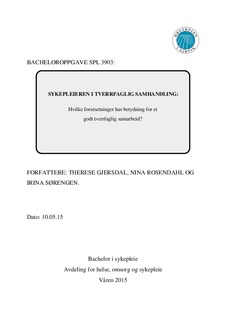Sykepleieren i tverrfaglig samarbeid
Bachelor thesis
Permanent lenke
http://hdl.handle.net/11250/293389Utgivelsesdato
2015Metadata
Vis full innførselSamlinger
Sammendrag
NORSK: Introduksjon: Tverrfaglig samarbeid blir i samhandlingsreformen lagt frem som en metode for å løse utfordringer knyttet til pasientforløp.
Hensikt: Å undersøke hvilke forutsetninger som ligger til grunn for et godt tverrfaglig samarbeid.
Metode: Litteraturstudie. 8 primærkilder er kritisk vurdert, analysert og sammenfattet med teoretisk perspektiv og annen relevant litteratur. Søkeord: Interprofessional, teamwork, nurs*, role perceptions, nursing role, interdisciplinary, collaboration.
Hovedresultat: Faglige tradisjoner og hierarki hemmer tverrfaglig samarbeid. Bevissthet av egen profesjonsidentit; kunnskap om andre profesjoner, roller og ansvarsavklaring har betydning for godt tverrfaglig samarbeid. Sykepleierens koordinerende funksjon har betydning for å legge til rette et helhetlig pasientforløp. Tverrprofesjonell praksis er egnet arena for samarbeidslæring og samarbeidskompetanse.
Konklusjon: Tverrfaglig samarbeid kan bidra til helhetlige pasientforløp. Sykepleier kan i møte med andre profesjoner legge til rette for dette når profesjonelle roller, kompetanse- og ansvarsområder er avklart, og når gjensidig avhengiget og kunnskap om hverandres profesjoner er til stede blant profesjonsutøverene. Samardbeidslæring er nødvendig. ENGLISH: Introduction: Interprofessional collaboration is a method to solve challenges in the healthsystem related to fragmented patient care.
Aim: To explore significant conditions for good interprofessional collaboration.
Method: Literature review. Primary sources are critically assessed, analyzed and discussed with theretical perspective and relevant litteratur. Search terms: Interprofessional, teamwork, nurs*, role perceptions, nursing role, interdisciplinary, collaboration.
Results: Traditions and hierarchy inhibit interdisciplinary collaboration. Awareness of own professional identity; knowledge of other professions, roles and responsibilities clarification is important for good interprofessional collaboration. Nurses coordinating function has significance to facilitate continuity in patient care. Interprofessional practice is a suitable arena for collaborative learning and cooperative skills.
Conclusion: Interprofessional collaboration can contribute to continuity of patient care. Nurses can meet with other professionals to facilitate this when professional roles, responsebility and competences have been clarified, and when interdependence and knowledge about each other's professions are present among professionals. Learning to collaborate is necessary.
